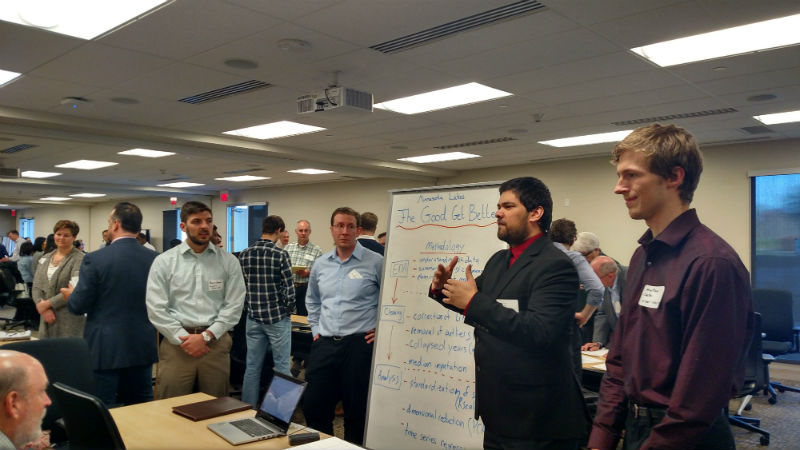Students gained valuable experience while showcasing their skills to compete for more than $15k in prizes.
On Saturday, Nov. 5, teams of undergraduate and graduate students from across the Midwest gathered at Optum in Eden Prairie for MinneMUDAC: Dive Into Water Data. Each team shared insights developed through weeks of exploring Minnesota water quality and property data.
More than 75 analytics professionals serving as judges were tasked with scoring the teams, and the competition was tight. After narrowing the field to eight finalist teams (four undergraduate and four graduate), winners were chosen from each division in three categories: Overall, Analytic Acumen and Serendipitous Discovery.
First Place (Overall)
Awarded to the teams with the highest level of business insight provided with the most actionable recommendations.
- Graduate Division: Capella University
- Undergraduate Division: Carleton College
Analytic Acumen
Awarded to teams with the most technically appropriate and accomplished team presentation.
- Graduate Division: Carlson School of Business
- Undergraduate Division: South Dakota State University
Serendipitous Discovery
Awarded to teams providing the most interesting, if unrelated, findings or insights.
- Graduate Division: University of Minnesota Twin Cities Biostat
- Undergraduate Division: Winona State University
“Presentations were evaluated on three primary components, including data cleaning, data analysis and final presentation clarity,” said Mark Gorman, co-chair of the event and MinneAnalytics board member. “The winners did an excellent job of not only analyzing the data, but also presenting that information effectively in the fifteen minutes provided.”
MinneMUDAC represents a partnership between MinneAnalytics, the Midwest Undergraduate Data Analytics Competition (MUDAC) and Social Data Science. The idea for the event formed during a MinneAnalytics Education Forum held over the summer, the results of which showed a clear need for experiential learning opportunities to connect student talent with organizations.
“By partnering with MUDAC, we had an opportunity to work with an organization that has successfully organized several student analytics competitions,” Gorman said. MinneAnalytics was able to engage the business community through its large member base of analytics professionals, providing experienced judges able to give valuable feedback.
Chris Malone, co-chair of the event and a founder of MUDAC, agrees that these experiential learning opportunities are important to students now more than ever: “The transcript doesn’t mean as much as it once did—sharing what you can do is becoming a bigger part of getting that job.”
Social Data Science brought another element to the competition by pulling together a set of data relevant to the community. This is the first time this large set of water quality data has been analyzed to this degree, giving the insights of the students greater impact.
“Both practicing and aspiring data scientists have a unique and sought after skill set that is out of reach for many nonprofits and NGOs,” said John Hogue, event co-chair and founder of Social Data Science. “Events like this provide participants a way to give back in an extremely meaningful way.”

Subject matter experts from departments such as the Metropolitan Council Environmental Services and the Minnesota Office of Water Prediction were among those evaluating the competition, serving as “client” judges. The interaction with these experts was not only beneficial to the students, but also to the experts themselves.
“It was really exciting to see young analysts so excited about water problems, and I was impressed by the amount of research many of them did on how to measure water quality and what the drivers of water quality are,” said Emily Resseger, principal environmental scientist, Metropolitan Council Environmental Services.
According to Hogue, the competition also offers more concrete benefits to students aspiring to work in Data Science and Analytics:
“A competition like MinneMUDAC provides a level playing field for students to showcase their talent. The questions asked mirror messy real world problems that businesses face every day. The interviews and presentations mimic how professionals must explain their analysis, rationale and recommendations in a world full of competing priorities and conflicting stories. MinneMUDAC gave students a glimpse into the world of Data Science and gave businesses direct access to the top talent of the next generation of data scientists.”
The insights found during the course of the competition will be disseminated to the subject experts and their organizations to continue the work started by the event participants. Many of the experts look forward to working directly with the students in the near future. Overall, MinneMUDAC provided a unique opportunity for analytics students and professionals alike.
Thank you to all of the students, advisors and analytics professionals who participated in this event. For more information about MinneMUDAC, contact education@minneanalytics.org. The data and other competition details are available on the event webpage.
Links:
- Event photos available here.
- Presentation materials from some participating teams available here.

